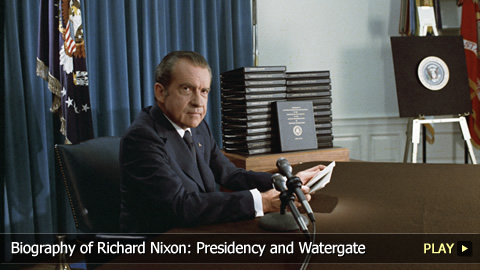Biography of Richard Nixon: Presidency and Watergate

Early Life
Richard Milhous Nixon was born January 9th, 1913 in Yorba Linda, California. During his modest and conservative Quaker upbringing, he became a skilled debater. He won a scholarship to the Duke University School of Law, and graduated in 1937.
Early Career
After attempting to join the FBI, Nixon practiced law in Whittier, California. In 1938, he met Pat Ryan, and they married two years later.
Military Career
In 1942, Nixon enrolled in the U.S. Navy. After serving in the Pacific Theater of World War II and rising to lieutenant commander, he returned to civilian life in 1946.
Beginning of His Political Career
Nixon and his family then moved back to Whittier, where he ran as a Republican for Congress. He won, and two years later he was easily reelected. During his congressional term, he rose to national prominence as a member of the House Un-American Activities Committee when he proved instrumental in breaking a prominent Soviet spy case.
Tricky Dick
At the end of 1949, Nixon ran for the United States Senate. During this campaign, he was given his enduring nickname “Tricky Dick.”
The Checkers Speech
In 1952, Dwight D. Eisenhower chose the 39-year-old senator as his vice presidential candidate. Scandal hit when Nixon was accused of maintaining a slush fund of contributions. Nixon defended himself to 60 million Americans with a televised address on September 23rd, 1952. The public responded favorably to “The Checkers Speech,” and the Eisenhower/Nixon ticket won the election that year.
Vice Presidency
During his two terms as vice president, Nixon managed important foreign and domestic issues. He also made high-profile journeys overseas: one example was his visit to the Soviet Union where he spontaneously debated Nikita Khrushchev on the merits of capitalism versus communism.
Nixon vs. Kennedy
In 1960, Nixon ran for president against Democrat John F. Kennedy. The unprecedented series of televised debates was a turning point in the campaign: Nixon’s physical appearance compared to Kennedy’s was sickly, and this helped lead to his narrow defeat in the election.
End of His Political Career?
Nixon then returned to California to write. In 1962, he ran for state Governor, and his loss signaled to many the end of his political career. He did not run for president in 1964, and Lyndon Johnson humiliated the Republicans at the polls. Despite everything, Nixon remained a GOP star, and in 1968 he made another run at the presidency.
President Nixon
With Johnson’s withdrawal, the ongoing Vietnam War and the assassination of star Democrat Robert F. Kennedy, it was a turbulent time. The Republicans capitalized on this, and on November 5th, 1968, Richard Nixon was elected the 37th President of the United States.
Presidential Accomplishments
While in office, Nixon dealt with an unstable economy, and oversaw reforms in welfare, civil rights and more. In foreign affairs, Nixon helped end the Vietnam War, reestablished contact with China and improved relations with the Soviet Union.
Reelection
In 1972, Nixon was reelected in a landslide victory. However, his undoing was already in the works: a few months prior to his reelection, a group of men linked to Nixon’s administration was arrested at the Democratic Party headquarters in Washington’s Watergate complex. Washington Post Reporters Bob Woodward and Carl Bernstein broke the story with help from informant “Deep Throat,” and what followed was one of the biggest scandals in presidential history.
Watergate
The Watergate Scandal was revealed as a cover-up by the Nixon administration to hide involvement in illegal activities against their opponents. It ultimately led to Nixon’s resignation from the presidency on August 9th, 1974.
Frost/Nixon Interviews
Nixon was granted a full pardon by the Ford administration a month later. A few years later, he was paid $600 thousand by British TV personality David Frost for a string of in-depth television interviews. Between 45-50 million people watched the Frost/Nixon interviews when they aired in 1977.
Last Years and Death
The last decades of Nixon’s life were spent rebuilding his reputation as a best-selling author, senior statesman and foreign-policy specialist. On April 22nd, 1994, Nixon died after suffering a massive stroke, ten months after his wife’s passing.
Legacy
He is remembered by many as the face of the embarrassing Watergate Scandal. However, Richard Nixon’s contributions to world peace also shaped his legacy.
